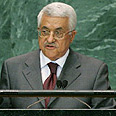
Abbas threatens referendum on Hamas gov't
Palestinian president blames Islamic group for impasse in talks on national unity government with his Fatah party; says Hamas rejected prisoner exchange deal reached with Israel
"I am supposed to care for the Palestinian people and if we won't reach a new path through a national unity government or a government of technocrats I would have to ponder over all the options available to me by law," he said, hinting that he may disband the government and call for new elections.
"I reject threats that if this were to happen, a civil war will break out," he said.
He also said he may hold a referendum on the future of the Hamas government.
"If there is no constitutional text on the issue, I will go to the people and hold a referendum," Abbas told a news conference.
He also called the government "rebellious," accusing Hamas of refusing to recognize the Palestine Liberation Organization and previous agreements signed with Israel.
Abbas charged that Hamas' hard-headed stance on key policies sabotaged the chances of forming a national unity government and worsened the situation in the Palestinian territories.
He said Hamas' rejection of the international community's demands that it recognize Israel and denounce violence prompted international donors to enforce a ban on the Palestinian Authority.
Abbas said Hamas refused a prisoner exchange deal he had negotiated with Israel, thus sabotaging plans to release hundreds of Palestinian prisoners in exchange for Gilad Shalit, the Israeli soldier kidnapped by Hamas in a cross-border attack on June 25.
He also linked Shalit's release to progress in the formation of a Palestinian unity government. "I reached an understanding with Israeli Prime Minister Ehud Olmert on releasing prisoners, but Hamas' position prevented the finalization of an agreement," he said.
Abbas accused Hamas of stymieing talks with Israel that it stop its military incursions in the Gaza Strip in return for a halt in Qassam fire. "I said, and I say again, that these rockets are unnecessary and cause damage," he said.
‘Hamas sabotaged unity government’
Abbas discussed the ruinous path which led the Fatah and Hamas to the diplomatic impasse: “After the agreement on a unity government was complete, Haniyeh and I told the world, to inform them of the understandings reached. The understandings were reached out of recognition that we don’t live on an island, but within a local international community, with rules and laws that must be considered so that we can assimilate and live in this world.
“We agreed there would be no comments on this document so that I could go and market it to the world as one that suits the demands and conditions of the international community, and thus convince the world that we respect the decisions and agreements.”
“But what happened was that Prime Minister Haniyeh – 15 minutes before I was about to leave for the trip (to New York) – told me there were three clauses he couldn’t accept. I explained to him that we had already agreed, but Haniyeh said the chief point needed to be the (armed) resistance as part of the government’s platform. I told him the resistance couldn’t include such a clause – it could be a political party’s plan but not that of a government leading a nation.”
“The second clause Haniyeh revoked his agreement on was regarding the fact that they didn’t want to take part in negotiations,” Abbas continued. “And the third clause they wanted to cancel was the Arab initiative, because they claimed it doesn’t mention refugees and requires recognizing Israel.”
“I told Haniyeh that the initiative was the first diplomatic document that mentions a just solution for the refugees, and that it stipulates recognizing Israel on a series of conditions, including full Israeli withdrawal from Palestinian territories,” he said.
“So I went to the UN with no power and no document, and meanwhile Hamas and the government were bandying about declarations, some of them provocative, which made my mission impossible,” Abbas summed up.










